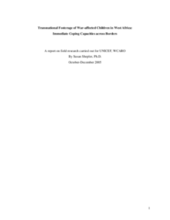This research was focused on the population of children who fled war in their own country (Côte d’Ivoire or Liberia) and are now living with a foster family in rural Guinea. A team of researchers spent sixteen days in a randomly selected location near the Ivorian border and searched for such children.
The study found that there is likely a large population of informally resettled refugee children living with local families. In this community, informal settlement appears to be working, as there is an impressive child protection capacity in the area. All children interviewed found someone to care for them within a few days of their arrival. Furthermore, the children and the carers are generally content with their living arrangements. However, there is the risk that children will fall through the cracks. These children, technically unregistered refugees, separated children, are receiving none of the benefits that other separated children and unaccompanied minors are receiving. Without assistance, they will be absorbed into the population and most likely will never be reunited with their families. Likewise, carers and children are asking for help with education and family tracing, though not necessarily family reunification.
©UNICEF

